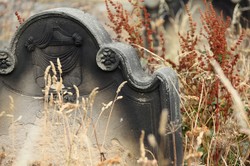
I really felt for Judy. As one of the region's transplant coordinators, her entire job revolves around this.
She has to travel to a local hospital and speak with grief-stricken families. It must be intimidating, facing them en masse.
Every person there has to know what's going on. In their tears and hysteria, they have to understand and agree.
I watched her neck turn blotchy with a rising blush. She kept her compassion alongside her professionalism. Despite her journey here, we could have backed down at any time.
There is a hierarchy of next of kin. Even with the whole family in agreement, the person closest can still say no. Judy had to walk a path of diplomacy. She did it with grace.
With formal consent given in bits of paper, the process swung into action. No lessening of care, no distress for the person on life support. But out in the wider world, 'phone calls are being made.
People who are going to die, if they don't receive a working organ, are called in. Imagine then the hope of their families, each having the list of risks high-lighted. It might not work. It might work. The outcome hinges on so many factors.
But the first has been won. The dying man's family gave their consent.
In three separate operating theaters, three teams scrubbed up. Time was of the essence. Once life support was switched off, then death had to occur within an hour. Beyond that, the organs will be rendered useless and can't be used. Nothing is going to happen to speed that up. Painkillers or sedatives will be given, if there is any distress.
The only things that changed were that no machines are artificially keeping this person alive. Resuscitation will not occur, if this person's heart stops beating. His family are all around him, holding his hand, kissing his face, saying their final words into his ear.
They can only imagine what it's like around two other beds. There the atmosphere is hope, tinged with anxiety. If he doesn't die in time, then they will all have to go home. If he does, then there is still major surgery involved to give them his organs.
The dying man's family see none of this. It's not in their ward. It might not even be in their hospital. They can only be certain that somewhere down a corridor, local surgeons are waiting to take his organs.
Five minutes after death. The family will be given five minutes to finish their goodbyes after he has gone. They have all the time in the world beforehand.
We all wait. Our worlds filling only the confines of that cubicle. Focused on the deathbed. But an hour passes and he remained. It feels like a senseless death has been rendered all the more so, because time went on.
Judy the transplant coordinator, dressed now in her scrubs, came to say her goodbyes. She was handing over to a ward nurse, after hours on the job.
She must have been bitterly disappointed, but she didn't show it. All her work that night came to nothing. She would have to speak with two families, who'd be told that their loved ones couldn't be saved tonight.
But she acted like this was fine. To my family, this was all good. My uncle breathed still.
I watched my mother give her a big hug. It came from us all. I couldn't do Judy's job. It would break my heart too much. But I'm glad that she is there to do it for us.
And I can do my own job. I can raise awareness of the reality here. I can write.


 I never want to be in a room like that again. Crammed in, brothers, sisters, in-laws, older off-spring, and a spouse sobbing at the incomprehensible.
I never want to be in a room like that again. Crammed in, brothers, sisters, in-laws, older off-spring, and a spouse sobbing at the incomprehensible. 





 St Tydecho's Churches in West Waleson 09/03/2014
St Tydecho's Churches in West Waleson 09/03/2014
 Goodies for an Outlander Premiere Partyon 03/06/2015
Goodies for an Outlander Premiere Partyon 03/06/2015
 Holocaust Memorial Day Interview with Rainer Höss, Grandson of Rudolf Architect of Auschwitzon 01/24/2015
Holocaust Memorial Day Interview with Rainer Höss, Grandson of Rudolf Architect of Auschwitzon 01/24/2015
 Romantic Valentine Gifts for an Outlander Fanon 01/16/2015
Romantic Valentine Gifts for an Outlander Fanon 01/16/2015



Comments
Thank you very much for that, Jill. I have added it to the list.
Thanks for your article. Please add the website for the registry in Manitoba, Canada: www.signupforlife.ca.
Thank you. And thank you too for registering yourself and having that discussion. It's not a pleasant topic, but one which needs to happen. <3
I'm sorry Jo for the loss of your uncle. This is a great article though and raises much needed publicity for the register. I have had the discussion with my family and I'm on the register - take anything but my eyes. I don't know why but that's just a bit too ickie for me to contemplate
Thank you very much. <3 That's on behalf of the person whose life you eventually save. <3
That donation option really should be on British licenses too. It's a really good idea.
I'm a donor. A friend and I were just talking last night about having our bone marrow tested to determine if we could be placed on the donors list for that as well.
We have the donation option on our drivers license, it is indicated by a small red (yet obvious) heart.
Thank you. <3
It's great to get so much clarification about how to get on the register in the USA. In Britain, we're not asked when we get driver's licenses. It would make so much sense if we were.
I'm right there with you on the whole donation/saving lives thing. It looks to me like you and your whole family are wonderful people.
I think that many of the taboos, or lack thereof, concerning organ donation are cultural. But in some countries, there isn't even a register. That is a great shame.
I'm sorry for your loss. :(
Here in the U.S., at least where I live, you can check a box when getting your pedestrian's, learner's, and driver's permits and when your information goes through the system you'll automatically be added to the donor's list like Ember said. Our licenses here have a little heart symbol on them if we checked yes, not just a sticker.
The way I see it, I'm dead. What good are my organs to me if I'm dead? None whatsoever. I've given blood when I was alive, so how is giving organs when I'm dead any different? Again, none whatsoever. I'd just be happy I was able to save a few more lives even after I was gone.
I don't know, maybe that's just how it is here. I know my parents and grandmother all have the symbol as well. Maybe it's a culture thing. :/
That's awful about that emergency room doctor. :( I know that didn't happen with my uncle. He was given the best of care and, when the donor window closed, nothing more was said about it. The emphasis at all times was on what was best for my uncle.
I've been a donor for a long time. Before the registry, DMV would put a little, pink dot in the form of a sticker on the back of your drivers license. One day I was discussing this with my brother. He said no way was he going to become a donor, because he was afraid he'd end up in an emergency room and the doctor would let him die to get his organs. I thought this was really irrational thinking and told him so.
One day, I saw on the news that an emergency room doctor had been arrested for selling organs. I still left my sticker on. Then I saw a news report about a year later that it happened again. I took that sticker off then.
I renewed my license a couple of years ago and I was asked if I wanted to be a donor. I told the girl no and explained why. She told me about the registry that's being used now. So I'm back on the registry.
I can't see keeping anything that I don't need anymore.